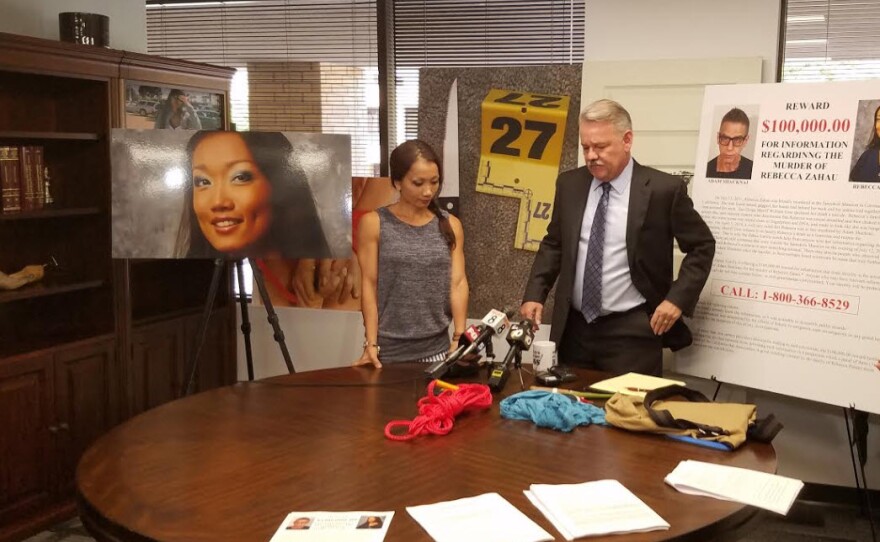The sister of Rebecca Zahau, whose bound and nude body was found hanging from a balcony at a historic Coronado mansion, offered a $100,000 reward Wednesday for anyone offering new information that could lead to the arrest and conviction of Adam Shacknai — the brother of Zahau's boyfriend — for her 2011 death.
Despite two law enforcement rulings that Zahau's death was a suicide, Zahau's family contends that Shacknai murdered her, possibly in retaliation for the death of his 6-year-old nephew Max, who suffered an ultimately fatal fall while in Zahau's care.
Zahau was found July 13, 2011, hanging by her neck above a rear courtyard at her boyfriend's beachfront summer home. She was gagged, with her ankles bound and her wrists tied behind her back.
Shacknai was cleared by law enforcement, but Zahau's sister, Mary Zahau-Loehner, says that a new analysis of Shacknai's polygraph test shows that he was not truthful with law enforcement during their investigation into Zahau's death.
The family has filed a civil grievance with the San Diego County Sheriff's Department, which concluded Zahau's death was suicide. Zahau-Loehner said she and her family would continue to dispute those findings.
RELATED: Sheriff Doubles Down On Suicide Ruling In 2011 Coronado Mansion Hanging
"I wish you all could have known her," she told reporters during a Wednesday news conference. "She was an incredible person and she sure knew how to make someone smile. And she was a fighter. And I know she fought the night she died and she left plenty of clues and plenty of evidence that were ignored."
Despite the sheriff's findings, Shacknai was found liable in Zahau's death by a San Diego civil jury last year, which awarded Zahau's family more than $5 million in damages. The case was later dismissed at the behest of the Zahau family's attorney, Keith Greer, with a settlement reached between the family and Shacknai's insurance company.
Two days before Zahau's body was discovered, her boyfriend's son, Max, was gravely injured in a fall over a second-story stairway banister inside the stately Ocean Boulevard home, known locally as the Spreckels Mansion. The boy died five days after the accident, which occurred while he was under Zahau's care.
Following a seven-week investigation into Zahau's death, the Sheriff's Department and the San Diego County Medical Examiner's Office ruled that she had killed herself in an unusual but not implausible or unheard-of manner — by tying a rope around a bed, wrapping the other end of it around her neck, binding her feet and hands, and throwing herself off a second-floor balcony.
RELATED: Jury Rules Boyfriend’s Brother Liable In Woman’s Death At Coronado Mansion
At the civil trial, Greer alleged that Shacknai delivered four blows to Zahau's head, rendering her partially or fully unconscious, molested her, tied her hands and feet, put a noose around her neck and pushed her off the balcony.
Greer told the civil jury a cryptic phrase found scrawled on a bedroom door at the mansion in black paint — "She saved him, can you save her" — had been put there by Shacknai.
Shacknai insisted that he had nothing to do with Zahau's death. At trial, he described emerging early in the morning from the guest house where he was staying on the grounds of his brother's estate and finding Zahau's body hanging from the second-floor landing.
He told the civil jury he called 911, cut Zahau down and tried to give her CPR, then called his brother to break the news that Zahau was dead.






